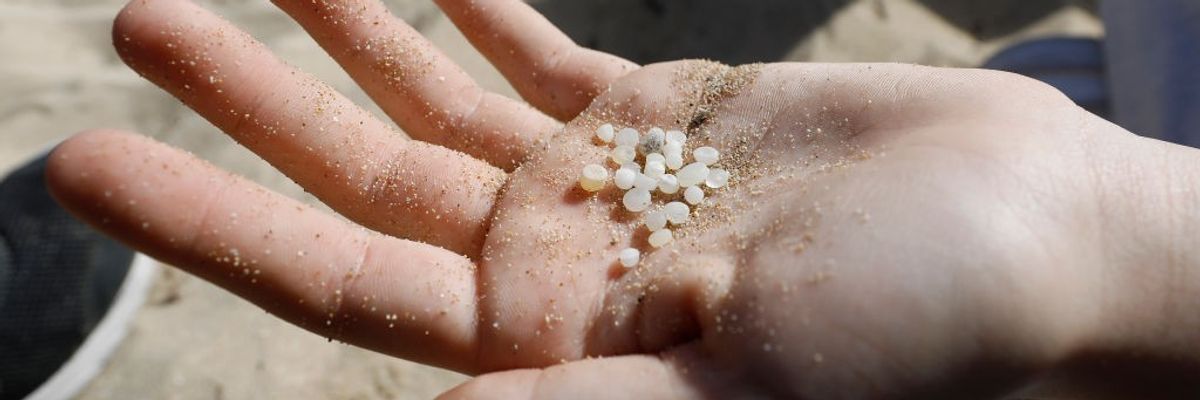September 20,
2024
Some of the key
scientists who first informed the world of the potential damage being done to
natural systems by microplastics are now calling for world leaders to take
decisive action to curb the introduction of these polluting materials into the
environment—and they hope the looming United Nations treaty process on plastics
can be a key vehicle for progress.

Children collect trash on the beach of Can Pere Antoni while participating in the educational program of the NGO "Safe the Med". (Photo by Clara Margais/picture alliance via Getty Images)
Alongside a new
scientific review published cataloging the growing body of research on
microplastics—defined as plastic particles smaller than 5 millimeters and
"composed of polymers together with functional additives as well as other
intentionally and unintentionally added chemicals"—the international group
of scientists says concerted actions must be taken, including bans on certain
materials and a focus on plastic pollution mitigation that puts less emphasis
on consumer habits and recycling efforts by keeping microplastics out of the
supply chain "in the first place."
According to the
abstract of the review, published Thursday in the journal Science:
Twenty years
after the first publication using the term microplastics, we review current
understanding, refine definitions and consider future prospects. Microplastics
arise from multiple sources including tires, textiles, cosmetics, paint and the
fragmentation of larger items. They are widely distributed throughout the
natural environment with evidence of harm at multiple levels of biological
organization. They are pervasive in food and drink and have been detected
throughout the human body, with emerging evidence of negative effects.
Environmental contamination could double by 2040 and widescale harm has been
predicted. Public concern is increasing and diverse measures to address
microplastics pollution are being considered in international negotiations.
Clear evidence on the efficacy of potential solutions is now needed to address
the issue and to minimize the risks of unintended consequences.
Professor
Richard Thompson of Plymouth University, who co-authored that first scientific
study and coined the term microplastics just two decades years ago, says
researchers now have more than enough evidence to show world leaders that
serious action must be taken to curb the use of plastics, with special
attention to the minuscule and microscopic forms of the material that are
increasingly being found polluting ecosystems—both on land as well as in the
sea—and embedded within living organisms, including humans.
"There are
still unknowns, but during the 20 years since our first study, the amount of
plastic in our oceans has increased by around 50%, only further emphasizing the
pressing need for action," Thompson said in a statement put out by
Plymouth.
In the
statement, the university noted:
Since the
publication of the first study in 2004, an estimated 7,000 research studies
have been conducted on microplastics, providing considerable evidence in their
sources and impacts as well as potential solutions.
Microplastics
have been found on every corner of the planet, in more than 1,300 aquatic and
terrestrial species, in the food and drink we consume, and in multiple tissues
and organs of the human body.
With emissions
of microplastics to the environment estimated to be up to 40 megatons per year,
a number that could double by 2040, predictions indicate the potential for
widescale environmental harm moving into the next century.
The research
details how microplastics demand an international response due to their
transitory nature. While they enter the environment in various ways—whether
from direct release as fibers into the air from textiles or dust, discharged
through water systems via runoff or sewage drains, or via breakdown or
fragmentation—once discarded, the study says, "microplastics can travel
far from their point of entry and are not constrained by national boundaries
highlighting the importance of actions at a global level."
Professor Sabine
Pahl, who teaches Urban and Environmental Psychology at the University of
Vienna and is an honorary professor at the University of Plymouth, said,
"Plastic pollution is completely caused by human actions. That's why we
need research on perceptions of risks and benefits of plastic as well as other
drivers of policy support and change, integrating a social science
perspective."
With the next
round of talks in the UN's Plastic Pollution Treaty set for November, the
researchers said the negotiations offer a "tangible opportunity" for
nations to act on this issue. "In our view," they wrote,
"science will be just as important guiding the way toward solutions as it
has been in identifying the problems."

No comments:
Post a Comment